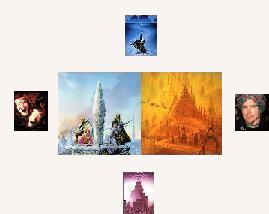
Memory, Sorrow, and Thorn
When frost doth grow on Claves’ bell
And shadows walk upon the road
When water blackens in the well
Three Swords must come again.
When Bukken from the earth do creep
And Hunën from the heights descend
When Nightmare throttles peaceful sleep
Three Swords must come again.
To turn the stride of treading Fate
To clear the fogging Mists of Time
If Early shall resist too Late
Three Swords must come again.
- prophecy from The Dragonbone Chair
Memory, Sorrow, and Thorn was the first epic Tad Williams undertook. Williams said in an interview that he was inspired by the world of Tolkien, and similarly by the modern epics that are told in that spirit. Specifically, he undertook to write something along the same lines in form, but different in tone and content. And he succeeded. In form Memory, Sorrow, and Thorn is the Tolkien fantasy epic. It is roughly 3,300 pages long, exceeding Tolkien's tale by quite a bit. The last book alone is longer than the entire Lord of the Rings trilogy.
Williams' characters are, at first glance, cut from the same cloth all traditional fantasy heroes and villains are. Simon is the main character, a cookboy whom we follow through the course of the epic as he changes into a knight and hero. Miriamele plays the stock character of the rebellious, strong-willed princess/love interest. Pryrates is the evil advisor, secure in power despite his cruelty and practice of black magic. Doctor Morgenes plays the age-old role of the wizard. Prince Josua Lack-hand takes the place of the noble future king, a sort of Aragorn with elements of kings from Irish myth. Other aspects of this novel are also taken from European folklore, as is the case with most Tolkien-esque epics. The Sith, a race of Irish fair folk, become Sithi, the elves. The other races in this novel have their European counterparts as well.
However, there is some innovation in Williams' epic as well. Williams' claims to fame are his characters. Each is psychologically rich and realistic, well-rounded and complex. This attention to development saves the characters from cliché. So although they are in function stereotypes (or archetypes, rather) they are just as individual and original as characters from the canon of literature.
And although elves and trolls are the bread and butter of fantasy epics, Williams puts a bit of a spin on them that makes for something truly original. The Sithi are not fair, as with most elves in fiction and myth. Rather, they have golden skin, and white hair that is dyed in various colors. What's especially unique are the cities they have. The homes are constructed from brightly colored blankets, and their main hall has a roof composed of butterflies that flock there when meetings take place. Also, the "bad guys", the Norns, are actually a branch of the Sithi race, which isn't seen often. The trolls, rather than big, hulking, man-eating savages, are a race of small folk that live in the snowy mountains, with tinges of Inupiat culture apparent in their customs and lives.
The quest that serves as impetus to the plot is driven by a prophecy that is similar to most found in fantasy epics. Basically, the characters must get the quest items and bring them together in order to fight an evil that can destroy the entire world. Although this is so often repeated in fantasy epics as to almost become a characteristic of them, Williams does things that make it innovative. The good guys aren't always winning, and indeed the trials and changes they undergo make it seem that victory is impossible. This may be contributed in part to the struggle Williams underwent while writing the last book. During the creation of To Green Angel Tower Williams divorced, an affair that was extremely painful for him. This sad event, however, made the tone rich and different than most epics, thus saving it once again from cliché.
All in all Memory, Sorrow, and Thorn is a fantasy epic well worth the read, if you have the time and patience to undertake it. The length of story, while intimidating, gives the reader the chance to sink into Williams' incredibly complex and realistically rendered fantasy world. The characters are well-developed and engaging, and although the plot is typical of a fantasy epic, the differences in style and theme make it an interesting read.
For further information on Memory, Sorrow, and Thorn, check out the two theses in the links section.